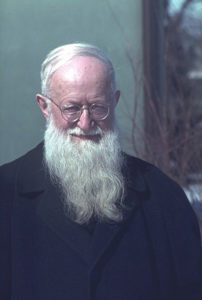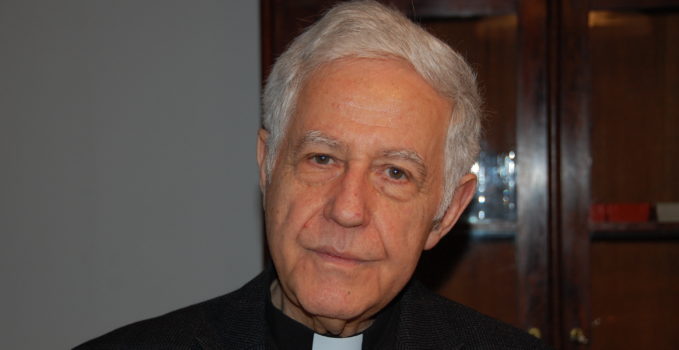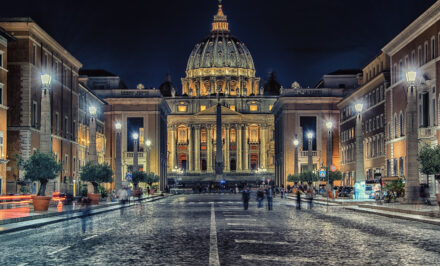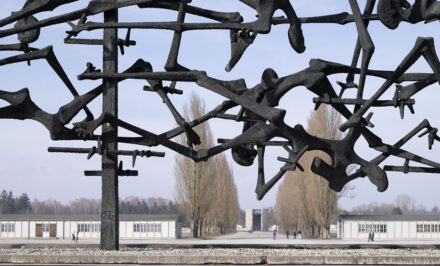Editorial Staff •
“I am happy you liked the interview,” Fr. Angel Strada responded to the schoenstatt.org editorial staff’s congratulatory email referring to an interview published on the German Schoenstatt Movement’s official website, www.schoenstatt.de in December 2016, on the occasion of the change of postulators in the process of Father Kentenich’s canonization.
We are very happy now to be able to offer the English translation of said interview.
Fr. Strada, at the beginning of 2017, you will have surrendered your position as Postulator for the process of beatification for Fr. Joseph Kentenich to Fr. Eduardo Aguirre. How long have you been carrying out this task?
 Fr. Strada: I arrived in Germany in 1984, and my first task was that of Rector of Joseph Kentenich College in Munster. I was there for eight years. Then in 1992, I was elected to the General Council, and I have been here since then. Being a member of the General Council, I was named Postulator on January 20, 1997. In January 2017, it will be exactly 20 years that I have been at this post.
Fr. Strada: I arrived in Germany in 1984, and my first task was that of Rector of Joseph Kentenich College in Munster. I was there for eight years. Then in 1992, I was elected to the General Council, and I have been here since then. Being a member of the General Council, I was named Postulator on January 20, 1997. In January 2017, it will be exactly 20 years that I have been at this post.
If you think about those beginnings, what is the greatest impression you had upon taking over this position, and at that time, having received it from the one who had been the first postulator in the beatification process – Fr. Engelbert Monnerjahn?
Fr. Strada: Reception of the task was done quickly. I was only able to speak with Fr. Monnerjahn two or three times before he died in September of 1997. I certainly had dozens of questions, but it was no longer possible to clarify them with him. Furthermore, the process was still very much in its beginning stages, especially since the episcopal Delegate had just started reviewing it. Therefore I had to practically start the process all over again in many aspects.
Already from the beginning, I was impressed by the quantity of documents, texts, writings and letters. There are 12,000 letters: from Fr. Kentenich, to Fr. Kentenich, about Fr. Kentenich, 6,000 conferences, etc. Slowly it was very clear to me that this process was greater than what I had imagined initially. To the former can be added that Fr. Kentenich reached an advanced age. Mario Hiriart died at only 32 years of age and wrote very little. Joao Pozzobon, a stupendous man and a great saint, almost wrote nothing. The case of Fr. Kentenich is very different: he wrote a great deal and, especially, he formulated a completely new message for the Church which, due to its newness, produced many special difficulties like, for example, the visitations. On the one hand, this was the joy since through this task I would be closer to the person of Fr. Kentenich, to his thoughts, his life, and his sanctity. And on the other hand there were, of course, difficult matters for which it was necessary to study, and many questions to answer.
Undoubtedly you already had a relationship with Fr. Kentenich. Was this relationship somehow modified or deepened upon having to dedicate yourself to Fr. Kentenich during the process of beatification?
Fr. Strada: I personally experienced Fr. Kentenich in the last three years of his life. In September 1965, he arrived in Rome from Milwaukee, and on Christmas Eve of the same year, he arrived in Schoenstatt. I saw Fr. Kentenich for the first time on March 29, 1966, in the Shrine of the Schoenstatt Sisters of Mary, during a conference for vocations to the Schoenstatt Fathers. The next day we traveled to Munster, in the diocese of Bishop Tenhumberg to begin our studies. In August of 1967, he himself came to Munster and gave us a retreat. On August 23rd, I was able to talk to Fr. Kentenich for more than half an hour after breakfast. This impressed me greatly. Although he was of short stature, he gave me the impression of being so big. One also had to become accustomed to how he expressed himself. I experienced him as someone who was very simple, human, humble and joyful, and at the same time, one could feel he was a man of God who was always attached to the other world and that God was truly a person for him.
Was this impression modified or strengthened during the process of beatification?
Fr. Strada: Yes, on the one hand this impression strengthened, but on the other hand, it became problematic. Incidentally by means of the process, I had contact with all the nuances of Fr. Kentenich’s personality. He was very much criticized by some of the Pallottine Fathers and other priests in the Dachau Concentration Camp; with the visitations, questions about his life and person come forth. In this sense, I say that it became problematic. And a couple of questions will remain for eternity. The process demands a profound examination of the person and his motives. And in each human being there are mysteries: Why did he act this way and not that way? Would it not have been more prudent to do this or that? And I kept telling myself: it is about the sanctity of a person, not of an angel. And to be a person implies error, problems, conflicts, failures, defeats. All of this pertains to human life. Sanctity without limits does not exist. I admire Pope John Paul II. He is a great saint. And nevertheless, he committed at least two great faults: the founder of the Legionnaires of Christ, who humanly seen was as a disaster, he presented him as a model of Christian life. A grave error. And he classified the sexual abuses of priests as an internal matter of the Church and not as a matter for justice. The Church suffered great harm because of this.
For the beatification process of Father Kentenich, I told myself that we must reject an image of our Founder where everything is perfect, where there was sanctity from the beginning. This Kentenich did not exist. One can say that in some stages, Fr. Kentenich had an incredible awareness of mission, but in the light of this mission, he probably demanded a great deal on some occasions. Let us take, for example, the topic of the Universal Apostolic Confederation. Already in the first years, in 1916, the General Superior of the Pallottines came and made a visitation. Some professors spoke critically about Fr. Kentenich. Later the General Superior asks Fr. Kentenich: “What does this new organization mean, what does this have to do with Pallotti?” And Fr. Kentenich said to him: “I only answer to Pallotti.” Another General Superior would have told him: “Slow down! You have only been a priest for six years and you only began this new organization two years ago. I am responsible for the Pallottines.” Fr. Kentenich demanded from other people leaps in confidence that not all were in a position to take.
So in your years as Postulator, you have also had to face those nuances of the person of Fr. Kentenich that are difficult to understand and that probably have made and make the process slower.
Fr. Strada: Yes, for sure. Very probably, these points will have to be examined anew during the second level of the process in Rome. Take for example, the tone of the “Epistola perlonga” to Bishop Stein of Treveris. It is written in a very hard tone. One could if that tone was necessary. Probably not. But good, each person has his way of being… And this is seen compensated by the incredible nobility of spirit in the surrender of Fr. Kentenich as a person. Something very minor, but not irrelevant: he was 80 years old when he gave us the retreat in Munster. I am a witness that even in this advanced age he worked eighteen hours a day. For example, he did not allow himself time to rest after lunch in order to have time to talk to each one of us.
In your long time as Postulator were there only difficult moments and a “constant processing of documents,” or were there also highlights and beautiful moments?
Fr. Strada: There were many beautiful moments. For example, skilled and fraternal meetings with Dr. Holkenbrink, the episcopal Delegate from Treveris. Also the meetings with the historical commission to which I was invited to all sessions. They were all highlight moments and beautiful shared experiences.
Upon contemplating the process of beatification today, after 20 years, are you satisfied with it or would you have wished for a different development?
Fr. Strada: I am satisfied. I only regret very much the “settling/resting” of the process in the last few years. It could have been taken to Rome more quickly. We still expects its closing at the diocesan level. I am happy about the classification of the documentation. Rome cannot complain. We have classified almost 80,000 pages. To this can be added an index of materials of almost 32,000 documents that can be found in the archives. And there are not only technical specifications there, but also a summary of the contents of the respective document. Dozens of people worked on this classification, Schoenstatt Sisters of Mary, Fathers, Ladies, laity, with great generosity. I do not even know some of them personally. Whenever I asked for help, I received positive responses. It can be said that the entire Schoenstatt Family values the work for the process, and they are committed to the beatification of Fr. Kentenich.
Your work as Postulator now ends. What will you do in the future? Will you return to Argentina?
Fr. Strada: No, I will stay in Germany and collaborate with Fr. Eduardo Aguirre as much as possible. He will need help since he will be confronted with 100,000 pages, and at the same time will have to prepare the phase in Rome for the process of beatification. By the way, I will assume other tasks in the community, in tertiates and retreats. I will also attempt to write something on the life of Fr. Kentenich.
Not long ago, a 10 year-old boy asked: “Why is it important for Fr. Kentenich to be beatified? One could also have him as a life companion.” What would you answer him?
Fr. Strada: I would say the following: in the first place, the saints are “special people in the Church” and I think that Fr. Kentenich deserves that uniqueness. They are clear examples on how to live the Gospel, and they are good intercessors in Heaven. By the way, I have the freedom to go to my grandfather in Heaven or to Fr. Kentenich. But it is different if the Church, with her authority, says that Fr. Kentenich is a good model of Christian life and a powerful intercessor.
The beatification would also be important for the full rehabilitation of Fr. Kentenich. Many know there were difficulties, but hardly anyone knows the history exactly. The beatification eliminates that. This is important for Fr. Kentenich’s honor.
How can the Schoenstatt Family collaborate in support of the process?
Fr. Strada: Of course, with prayer and contributions to the Treasury of Grace, but also in a concrete form like, for example, the families who helped the Notary in Treveris to stamp 100,000 pages in order to legalize them or the elderly Sisters of Mary who read the handwritten texts of Fr. Kentenich so they could be recorded and then digitalized.
I do not think we can speak of a quick beatification. The phase in Rome will be very demanding. The Congregation for the Cause of Saints has very few personnel. There is only one person responsible for every 400-500 processes of beatification in Spanish. One has to assume the reality just as it is.
Thank you, Fr. Strada, for this interview.
Heinrich Brehm from the Press Office of the German Schoenstatt Movement asked the questions.
Source (of the German version) www.schoenstatt.de with permission
Original German: Translation: Carlos Cantú, La Feria, Texas USA. Edited: Melissa Peña-Janknegt, Elgin, TX USA














